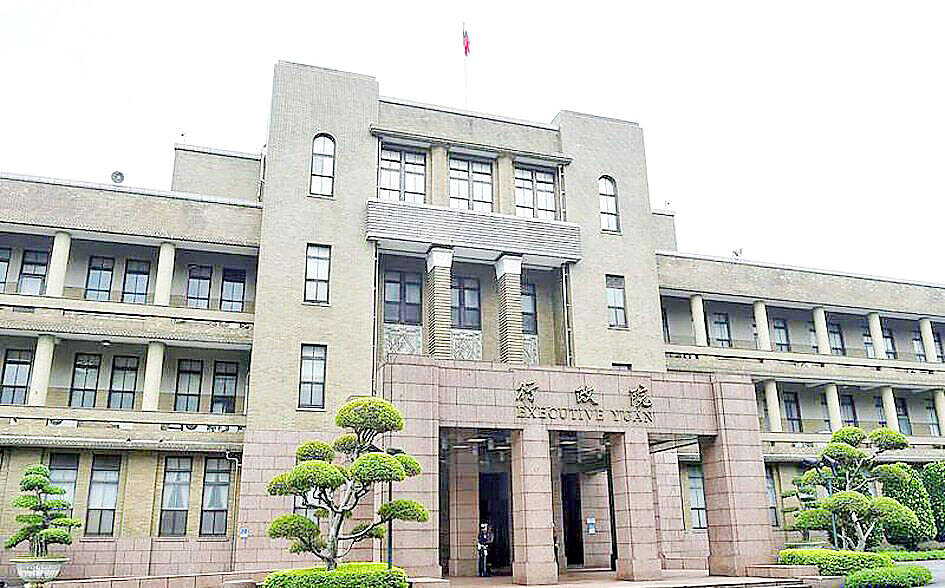The government is to step up countermeasures against spying and infiltration next year amid increased national security threats from China, the Executive Yuan said yesterday in a policy plan for next year that focuses largely on threats from Chinese “united front” warfare and the government’s response strategies.
The Cabinet would promote President William Lai’s (賴清德) 17 strategies aimed at countering Beijing’s influence operations, and boost the national defense budget to 3 percent of GDP, it said yesterday.
National security laws would be amended to pre-empt China’s “united front” infiltration and cognitive warfare, and cooperation with Taiwan-friendly countries in high-tech industrial developments would be bolstered to build a global democratic supply chain, it said.

Photo: Chung Li-hua, Taipei Times
Action plans for collaborations with allied countries would be formulated to convey Taiwanese’s will and a societal consensus opposing annexation by China, thereby counteracting Beijing’s attempts to downgrade or destroy Taiwan’s sovereign status in the international community, it said.
In terms of national defense, the Cabinet said it would use its resources to develop asymmetric warfare capabilities, enhance defense resilience, bolster the reserve force and improve the nation’s capacity in addressing “gray zone” intrusion based on the “resolute defense, multi-domain deterrence” strategy.
The training of the armed forces would follow a combat-oriented, joint-operations approach to enhance their capabilities in preparatory deployment, joint anti-amphibious operations, littoral and landing beach combat, deep defense and sustained operations, it said.
Arms and ammunition would be acquired through manufacturing, or commercial or military procurement based on joint operational needs, it added.
A certification and safety management system at the national defense level would be set up to support the development of a comprehensive supply chain for the national defense industry to achieve defense independence, the Cabinet said.
The government would continue to enhance Taiwan-US ties and deepen bilateral military exchanges and cooperation, it said, adding that it would also explore military exchanges with other pro-Taiwan countries through higher-level policy integration, military affairs reform and national defense industry developments.
Resources from central and local governments would be mobilized and used to invest in reinforcing whole-of-society defense resilience, it added.
The Executive Yuan said China’s actions against Taiwan should be carefully addressed and democratic defense resilience should be enhanced to steadily promote cross-strait exchanges, it said.

The manufacture of the remaining 28 M1A2T Abrams tanks Taiwan purchased from the US has recently been completed, and they are expected to be delivered within the next one to two months, a source said yesterday. The Ministry of National Defense is arranging cargo ships to transport the tanks to Taiwan as soon as possible, said the source, who is familiar with the matter. The estimated arrival time ranges from late this month to early next month, the source said. The 28 Abrams tanks make up the third and final batch of a total of 108 tanks, valued at about NT$40.5 billion

A group from the Taiwanese Designers in Australia association yesterday represented Taiwan at the Midsumma Pride March in Melbourne. The march, held in the St. Kilda suburb, is the city’s largest LGBTQIA+ parade and the flagship event of the annual Midsumma Festival. It attracted more than 45,000 spectators who supported the 400 groups and 10,000 marchers that participated this year, the association said. Taiwanese Designers said they organized a team to march for Taiwan this year, joining politicians, government agencies, professionals and community organizations in showing support for LGBTQIA+ people and diverse communities. As the first country in Asia to legalize same-sex

Travel agencies in Taiwan are working to secure alternative flights for travelers bound for New Zealand for the Lunar New Year holiday, as Air New Zealand workers are set to strike next week. The airline said that it has confirmed that the planned industrial action by its international wide-body cabin crew would go ahead on Thursday and Friday next week. While the Auckland-based carrier pledged to take reasonable measures to mitigate the impact of the workers’ strike, an Air New Zealand flight arriving at Taipei from Auckland on Thursday and another flight departing from Taipei for Auckland on Saturday would have to

MOTIVES QUESTIONED The PLA considers Xi’s policies toward Taiwan to be driven by personal considerations rather than military assessment, the Epoch Times reports Chinese President Xi Jinping’s (習近平) latest purge of the Chinese People’s Liberation Army (PLA) leadership might have been prompted by the military’s opposition to plans of invading Taiwan, the Epoch Times said. The Chinese military opposes waging war against Taiwan by a large consensus, putting it at odds with Xi’s vision, the Falun Gong-affiliated daily said in a report on Thursday, citing anonymous sources with insight into the PLA’s inner workings. The opposition is not the opinion of a few generals, but a widely shared view among the PLA cadre, the Epoch Times cited them as saying. “Chinese forces know full well that